The perils of inflexibility
George Osborne has rejected outright the possibility of further tax rises as part of the government’s fiscal consolidation programme. Analysing the forecasts for government borrowing the Institute for Fiscal Studies (IFS) recently said that in order to relieve pressure on...
George Osborne has rejected outright the possibility of further tax rises as part of the government’s fiscal consolidation programme. Analysing the forecasts for government borrowing the Institute for Fiscal Studies (IFS) recently said that in order to relieve pressure on departmental budgets the government may need to raise taxes. This would repeat a familiar recent pattern of tax rises immediately following elections.
The government’s deficit reduction strategy is premised on large spending cuts and a small amount of tax rises. It’s now argued that only 15 per cent of the overall consolidation package will come from tax revenues. In large part these have happened already.
Many things have slipped since this plan was outlined in 2010 (see figure one), not least the time frame over which the government will reduce the hole in the public finances. But George Osborne yesterday confirmed that one element would not – his position on tax.
Speaking to the Treasury select committee, the chancellor rejected warnings by the IFS that to maintain its original plans, the government is on course to raise £6bn through tax in the next parliament. The government continues to maintain that ‘there is no alternative’.
Two points are important to bear in mind in the light of Osborne’s remarks. First, there remain £25bn of cuts pencilled in after the next election in 2015. Secondly, on current plans these cuts will fall across ‘unprotected’ areas of departmental spending. To put this in perspective, by 2015-16 the communities budget will have faced a cut over 60 per cent.
In the absence of further tax increases and with ring fences for the NHS, schools and overseas aid still in place, by the end of the government’s consolidation programme unprotected areas of spending would have seen their real budget reduced by over 30 per cent.
Is this possible? Evidence received by the Fabian Commission on Future Spending choices suggests not and indeed the IFS itself has described some planned cuts as ‘inconceivable’.
The Fabian Commission has argued that while not being complacent about the deficit, a government in 2015 would face ‘constrained alternatives’. As we have argued elsewhere, in order to realise this a chancellor needs flexibility built into its plans, not rigidity.

